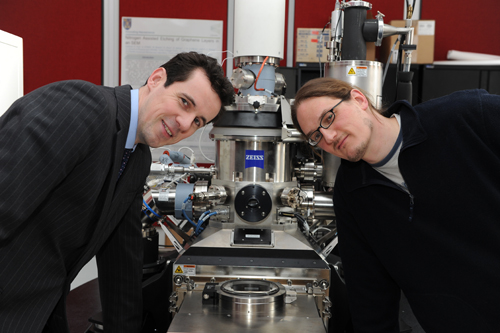CRANN Announces €750,000 Commercial Partnership with Thomas Swan & Co Ltd.
Posted on: 04 April 2012
CRANN, the Science Foundation Ireland (SFI) funded nanoscience institute based at Trinity College Dublin, has announced a new collaborative research partnership worth €750,000 with Thomas Swan & Co Ltd, a leading independent manufacturer of performance and speciality chemicals, based in the north east of England. The collaboration will focus on the industrial scale-up of graphene production. Graphene is the wonder material of modern science and was the focus of the Nobel Prize in 2010. It has unique properties and is both the strongest and most conductive material known to man. There are many potential applications for graphene including next generation electronic devices, mechanically strengthened plastics and new thermoelectric materials. Graphene is the focus of one of six of the EU’s FET Flagship Pilot research projects, two of which will be chosen to receive funding of €1 billion for 10 years from the EU Commission.

Harry Swan, Managing Director, Thomas Swan with Prof Jonathan Coleman, CRANN.
CRANN’s research in the field of graphene production is led by Professor Jonathan Coleman, who was named as SFI Researcher of the Year in 2011 and is also recognised as one of the top 100 material scientists of the last decade – the only Irish representative on the list. There is currently no method to produce high quality pure graphene on an industrial scale and the collaboration between CRANN and Thomas Swan aims to address this problem. CRANN has been identified by Thomas Swan as the leading academic research site globally for solution processing of graphene and the partner of choice around this challenging research area.
Thomas Swan, in addition to funding the research programme, will place an engineer to work with Professor Coleman’s team for two years. This partnership between industry and academia is a model for how world leading technology developed in Irish Universities can be exploited to provide both economic and societal benefit.
Commenting on the partnership, Dr Diarmuid O’Brien, Executive Director of CRANN, said: “This collaborative research programme with Thomas Swan underlines the strength of our industry engagement programme, which is bringing significant non-exchequer funding into CRANN and research in Ireland. It clearly demonstrates how CRANN has become a global focus point for both academic and industrial partnership. This international success has been built on the back of continuous funding for research excellence from the Irish State through Science Foundation Ireland.”
Harry Swan, Managing Director, Thomas Swan, added: “We are delighted to be working with CRANN and Trinity College Dublin on such an exciting project. Graphene is a fascinating material and our aim, as it was with carbon nanotubes, is to provide a stable and consistent source of true graphene to academia and industry as downstream research develops future commercial applications. CRANN and Professor Coleman’s team at Trinity College Dublin were a clear choice as the centre of excellence for us to approach and I look forward to developing a scalable production route of true, high purity graphene. We are anticipating initial lab samples within the next few months and will invite interested parties to assess our material as soon as it is available.”
Professor Coleman added: “I am delighted with our partnership with Thomas Swan as it will lead to the commercialisation of my research and is a very fulfilling achievement after many years of work. This will ultimately result in the production of graphene on an industrial scale, which we believe can compete with silicon for use in electronics and can contribute to an explosion in the development of a range of new materials.”
Graphene consists of a sheet of carbon atoms, just one atom thick or about one hundred-thousandth the width of one human hair. It is very strong and has excellent electrical conductivity which makes it a potential candidate for incorporation into a range of materials including thermoelectric devices, sensors and as a substitute for plastic in a range of products, from household goods to aeroplanes.
